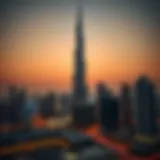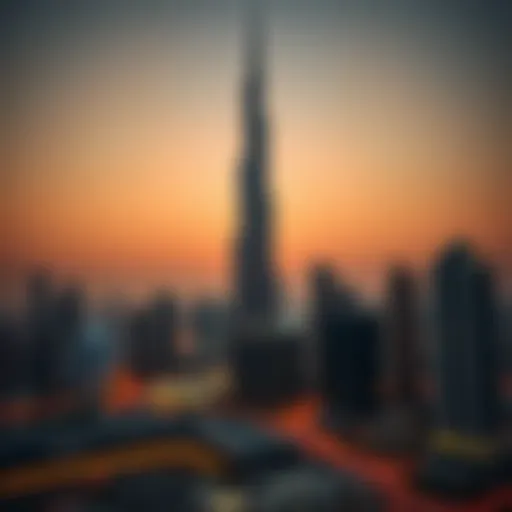Maximizing Bed Space in Dubai Gardens: A Comprehensive Guide
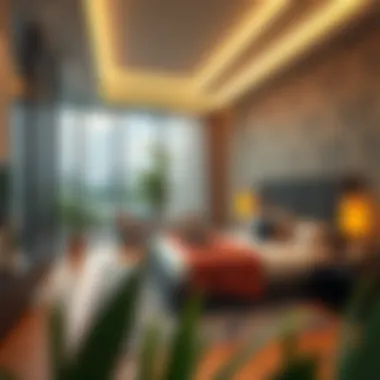

Intro
In a city where every square meter carries significant weight, maximizing garden bed space in Dubai offers both aesthetic and economic benefits. As the sun-drenched city continues to evolve, outdoor areas are increasingly viewed not just as yards, but as extensions of living spaces that can boost property value. This guide delves into strategies and insights to transform those often-underutilized garden beds into flourishing spots that meld beauty and functionality.
The concept of bed space in gardens encompasses a variety of elements, from the choice of plants to layout design, irrigation methods, and seasonal considerations. Given Dubai’s unique climate and cultural context, specific tailoring of these strategies becomes critical. Whether you’re a homeowner looking to enhance your property or an investor eyeing for promising real estate trends, understanding how to effectively utilize garden space is a vital skill.
With rising interest in green spaces, both local and international buyers are increasingly searching for properties that boast well-organized gardens. Not only can a charming outdoor area enhance the overall appeal of a property, but it also acts as a sanctuary from the bustling city life, elevating quality of living. To navigate this exciting landscape, we will discuss key market trends, investment insights, and innovative design strategies tailored to Dubai’s real estate environment.
Understanding Bed Space in Gardens
When we talk about gardens in Dubai, particularly the bed spaces within them, it can be more than just a patch of green. Understanding these areas becomes essential for anyone looking to maximize their property's potential. The bed space isn't just about planting a few flowers here and there; it's about creating a harmonious balance between aesthetics and functionality. The significance of this topic goes beyond mere beauty; it involves how well one can utilize these spaces for relaxation, gardening, or even social gatherings.
Key Elements of Bed Space:
- Functionality: The right design can make an area usable for various purposes, from entertaining to planting a vegetable garden.
- Aesthetic Appeal: A well-planned garden can enhance the overall beauty of a property, creating a welcoming atmosphere.
- Space Efficiency: Particularly in urban areas like Dubai, making the most of limited space is crucial.
By exploring these aspects, property owners can create not just a garden but a space that enhances their lifestyle and property value.
Definition and Importance
In layman's terms, bed space refers to sections or layout designs in a garden where various plants can grow. This can range from flower beds to vegetable patches. The importance of defining bed space comes from its impact on how effectively a garden can be utilized. Optimizing bed space means making thoughtful choices about what plants go where, which can be a game-changer for gardeners.
Benefits of Optimizing Bed Space:
- More Yield: Properly utilized space can lead to a higher yield if you're growing edibles.
- Easier Maintenance: A well-structured garden is easier to care for, especially in Dubai's warm climate.
- Increased Enjoyment: A space that flows well visually and functionally can lead to more enjoyment for the homeowner and guests alike.
Cultural Perspectives on Garden Spaces
Gardens in Dubai reflect a unique melding of tradition and modernity. While many residents appreciate the serenity that comes with a well-kept garden, there are also cultural aspects at play. Gardens often serve as extensions of public and community spaces, where family and friends can gather. The notion of a garden is also influenced by local customs. For instance, many households incorporate certain plants that hold cultural significance, whether for their beauty or blessings they are believed to bring.
- Cultural Significance: Gardens can symbolize hospitality in Arab culture, often influencing how homes are designed.
- Tradition vs. Modernity: While traditional plants may still find a place, modern gardening techniques such as vertical gardens are gaining traction.
- Community Gardens: These spaces are popping up around Dubai, showcasing how the community can come together and share gardening knowledge and resources.
Understanding these cultural perspectives allows property managers and homeowners to make informed decisions about landscaping and garden design that resonates with both personal preferences and the local culture.
The Role of Gardens in Dubai Properties
Gardens are often viewed as more than just patches of green; in the context of Dubai's real estate, they emerge as pivotal components that can enhance residential charm and overall value. The unique blend of high-end residential developments and lush greenery is something that many buyers now seek. As the landscape of Dubai continues to evolve, understanding the role gardens play in residential properties becomes essential for investors and homeowners alike.
Enhancing Residential Appeal
In today’s fast-paced urban lifestyle, having a garden isn't just a luxury; it's becoming a necessity for many homebuyers. A well-designed garden can significantly enhance the appeal of a property. Think about it: when prospective buyers safari through a neighborhood, the first impression often hinges on those vibrant green spaces.
A thoughtfully manicured garden does wonders in creating a welcoming atmosphere. It offers an oasis for families looking to unwind after a busy day and a playscape for children too. Furthermore, lush greenery has been shown to promote mental well-being, which adds an extra layer of desirability for potential tenants or buyers. When the kerfuffle of city life becomes overwhelming, gardens provide that serene retreat right at home.
Also, gardens boost privacy. Tall trees and shrubs can act as natural barriers, shielding your outdoor activities from prying eyes. This is particularly appealing to buyers wishing to maintain a sense of personal space amidst the bustling communities of Dubai.
In short, a garden is more than just a decorative feature; it's an integral part of the residence’s identity that builds a favorable perception amongst prospective buyers.
Impact on Property Value
The connection between gardens and property value is a well-documented phenomenon. Research consistently indicates that properties with well-maintained gardens tend to command higher prices in the market. Specifically, in Dubai where space is at a premium, the good use of garden space can be a game-changer.
Imagine a buyer standing in front of two identical houses: one boasts a lush garden while the other is just a blank patch of gravel. The garden house isn’t just more appealing visually; it's seen as providing potential for leisure activities, from hosting barbecues to enjoying quiet evenings under the stars. This leads buyers to perceive higher value.
Moreover, gardens can add functional space back to the homeowner. A garden doesn’t just sit there; it can be transformed into an entertaining area, a small vegetable patch, or even a play zone for kids. Each of these functions contribute positively to a property's overall appeal and value.
Another aspect to consider is the careful selection of plants. Native flora, which often requires less water and maintenance, can add beauty without the hefty upkeep costs associated with exotic species. This, in turn, makes the property more attractive to a broader range of buyers concerned with long-term sustainability.
"Incorporating vibrant green spaces enhances not only the aesthetic quality of a property but acts as a lucrative investment tool that can appreciate value over time."
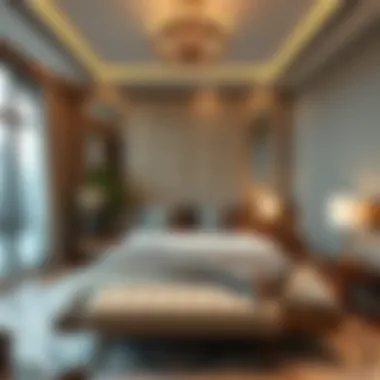

Design Considerations for Optimal Bed Space
When thinking about gardens in Dubai, the concept of bed space goes beyond mere aesthetics. It’s about creating an environment that serves various functions while blending in with the sunny, vibrant culture of the city. Thoughtful design consideration is the backbone of maximizing these precious garden spaces, especially in urban settings. Here, we will delve into functional layout planning and the incorporation of natural elements, two pivotal aspects to think of when looking to enhance a garden's usability and appeal.
Functional Layout Planning
A well-thought-out layout can make or break a garden's functionality. This starts with assessing available space. The dimensions, shape, and sunlight exposure of your area determines how you can best utilize it.
Assessing Available Space
In the realm of garden design, assessing available space is akin to setting the stage for a performance—it shapes everything that comes after. By evaluating how much room is available, homeowners can effectively decide which plants will thrive and where to plant them.
The key characteristic here is the ability to identify sunlight patterns. Gardens in Dubai often receive abundant sunlight, which can be both an advantage and a challenge. Understanding how shadows cast by surrounding buildings or trees play into growth patterns is crucial. This kind of assessment is beneficial because it helps not just in selecting plants but also in organizing them based on their sunlight needs.
One unique feature of assessing space is that it encourages creatively using vertical areas, such as walls and fences, which can contribute to a flourishing garden without taking up much ground space. However, overlooking this aspect can lead to overcrowding and underperformance of your plant selection, which no homeowner wants.
Zoning for Various Uses
Once you've assessed your available space, zoning for various uses takes the next step in optimizing your garden layout. This involves designating specific areas for different activities or plant types. A comfy lounge area for relaxation can exist right next to an herb garden that spices up meals.
Such layout planning turns your garden into an multifunctional space, and it’s a popular choice because it makes each square meter serve a distinct purpose. You might even want to include a small water feature or pathways that lead through different zones. This approach encourages exploration and engagement with the surroundings.
A unique advantage of zoning is that it provides a clear visual appeal and can help balance aesthetic joy with practical gardening needs. On the flip side, if not well-executed, one zone can overwhelm another, leading to a cluttered and disorganized appearance.
Incorporating Natural Elements
Lastly, the incorporation of natural elements in your garden design is vital. Not only does this tie the space back to nature, which is essential in an urban area, it also enhances the overall aesthetic. Think about native plants that require less water or stones that can create a path or border.
Adding elements like boulders, mulch, or even water features contributes to a garden's uniqueness. Such features work both visually and functionally, as they can help with drainage and serve as a habitat for local wildlife. Investing some thought into this aspect can lead to rain gardens or other eco-friendly practices that align beautifully with sustainable living standards in Dubai.
In summary, maximizing bed space in Dubai gardens requires proper design considerations. Engaging in thorough planning around functional layouts and incorporating natural elements not only elevates the garden but also reflects the values and priorities of its owners.
Innovative Gardening Techniques
Innovative gardening techniques have become central to maximizing bed space, particularly in an urban setting like Dubai where real estate is competitive and yard size often limited. With the right strategies, homeowners and investors can enhance their garden's usability while creating visually attractive outdoor spaces. Techniques such as vertical gardening and raised bed designs are not only smart but also eco-friendly, allowing individuals to cultivate a variety of plants without needing abundant ground space. This section dives deep into two effective methods that can transform your garden into a flourishing oasis.
Vertical Gardening Solutions
Vertical gardening is a dynamic technique that allows plants to grow upwards rather than outwards. This method is ideal for those looking to use every inch of available space. Think about it: with a well-planned vertical garden, you can cultivate herbs, flowers, and even some vegetables without taking up valuable floor area.
Benefits of vertical gardening include:
- Space Optimization: Perfect for smaller plots or balconies where area is at a premium.
- Aesthetic Appeal: A wall or trellis full of climbing plants can serve as stunning focal points.
- Easy Maintenance: Growing plants at eye level can simplify care routines.
When considering vertical gardening, think about the layout. You might opt for a living wall system, which features pocket planters or a trellis with climbing plants. These systems can create unique patterns or visuals, making your outdoor space truly stand out. However, remember that choosing the right plants is key; select varieties that thrive in vertical arrangements and climate conditions specific to Dubai.
Utilizing locally suitable plants can also further efficiency. Utilizing resources like Dubai Botanic Garden can provide information on native plant species that flourish in the hot climate.
"Vertical gardening isn't just a trend; it's a necessity in making the most of limited space."
Raised Bed Designs
Raised beds are yet another innovative approach for gardeners aiming to maximize their plant space. Constructing raised beds not only provides better soil management but also improves drainage and accessibility for maintenance. In Dubai's heat, raised beds can even help keep roots cooler, as they’re typically more aerated compared to traditional ground planting.
Key considerations for raised bed designs include:
- Construction Materials: Use durable, weather-resistant materials like treated wood or stone.
- Soil Quality: Fill beds with a high-quality mix that promotes good drainage and nutrient retention.
- Efficient Irrigation: Incorporating drip irrigation or soaker hoses can help keep water usage efficient.
Raised beds can vary in height and size, tailored to individual needs and preferences. They can be designed to fit specific themes or styles, aligning with the overall aesthetic of your property. It's also worth investigating how community gardens in Dubai are utilizing raised bed techniques, as these can often serve as inspiration for individual projects.
With careful planning, both vertical gardening and raised bed designs can elevate the experience of gardening in Dubai, making it not only practical but also enjoyable. To dive deeper into the topic, resources like Gardening Know How provide extensive guidance on these techniques, ensuring that you’re well-equipped to create the garden of your dreams.
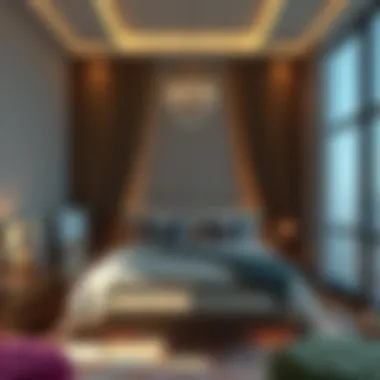

Landscaping Trends in Dubai
The greenery of Dubai is often seen in stark contrast to its sprawling urban landscape. As more residents search for ways to enhance their outdoor spaces, understanding landscaping trends in Dubai becomes vital. This section dives into contemporary practices and philosophies shaping gardens in this unique environment. Keeping in mind the climate, cultural influences, and pragmatic design choices, these trends not only beautify spaces but also contribute positively to property value and community well-being.
Sustainable Practices
Sustainability isn’t just a buzzword; it’s a lifestyle shift that many Dubai residents are embracing. More and more homeowners are looking at how their gardening choices impact the environment. Here are a few key aspects:
- Water Conservation: Given the arid climate, conserving water is paramount. Homeowners are opting for drip-irrigation systems, which deliver water directly to the plant roots, minimizing waste. Additionally, collecting rainwater during rare downpours can serve as a supplementary source for maintaining lush gardens.
- Composting: Many are turning kitchen scraps and yard waste into nutrient-rich compost. This practice not only reduces waste but also enriches the soil, leading to healthier plants that flourish.
"Every decision we make in our gardens echoes through the community. A resilient garden is a resilient community!"
- Eco-Friendly Materials: From recycled wood for decking to permeable pavers that allow rainwater to seep through, sustainable materials are becoming the preferred choice for discerning homeowners. This not only benefits the environment but enhances the aesthetic appeal as well.
Ultimately, these sustainable practices do not just keep the environment in check; they also pave the way for potential increases in property values as more people seek eco-friendly living spaces.
Utilization of Native Flora
Integrating native flora is gaining traction among gardeners in Dubai. This strategy is not only culturally relevant but brings several benefits:
- Adaptability: Native plants are inherently adapted to the local climate and soil conditions. This means they require less water and are more resilient to pests. As a result, they offer a robust solution for homeowners tired of battling with delicate exotic plants that struggle to survive.
- Biodiversity: By choosing local species, gardeners help support local wildlife, especially pollinators such as bees and butterflies. This creates a dynamic ecosystem that enhances the garden's life and vibrancy.
- Preserving Heritage: Using native plants fosters a connection to the region’s cultural history. Plants such as Ghaf trees and Date palms not only serve as functional landscape elements but also remind us of the heritage and natural beauty of the Arabian Peninsula.
When engaging with native flora, homeowners are also participating in a collective movement towards ecological restoration and stewardship. The more we embrace the plants that naturally thrive in our surroundings, the healthier and more harmonious our environment becomes.
Drawn together, these landscaping trends in Dubai reflect a deepening commitment to sustainability, community, and an ever-greater appreciation for what the local environment has to offer.
Regulatory Aspects of Garden Development
When considering garden spaces in Dubai, understanding the regulatory framework is paramount. This section dives into the nuances of local zoning laws and the permitting process relevant to enhancing one's garden. Being well-informed helps stakeholders such as investors, property managers, and homeowners to navigate potential legal hurdles while ensuring their garden visions are both beautiful and compliant.
Understanding Local Zoning Laws
Zoning laws are an essential piece of the puzzle when it comes to garden development in Dubai. These laws dictate how land can be used and can significantly impact what can be done in a given property’s outdoor space. Here are several aspects to keep in mind:
- Types of Zoning: Dubai has a complex zoning system that varies by area. Some zones may restrict certain types of structures or landscaping techniques, so it's vital to understand the specific zoning for a property. For example, residential areas may have rules that limit the height of fences or the amount of impermeable surface allowed.
- Usage Regulations: Certain properties are designated for particular uses—be it residential or commercial. Knowledge of these regulations can help homeowners to maximize their garden space effectively. For instance, a residential zone might permit more lush gardens while commercial zones may focus on aesthetic but minimalistic green areas.
"Understanding local zoning laws is not just a legal requirement but a pathway to unlocking the full potential of your garden space."
- Agricultural Permits: If the garden is to serve agricultural purposes, such as growing vegetables or herbs, different permits might be necessary. This is particularly relevant in areas where urban agriculture initiatives are being promoted.
Permits for Garden Enhancements
Before embarking on any garden enhancement project, acquiring the necessary permits is crucial. These are the steps and considerations involved in securing permits in Dubai:
- Research Requirements: Begin by checking with local authorities to identify which permits are needed. Not all projects require permits, but it's better to be safe than sorry. Reference websites like Dubai Municipality can provide updated guidelines and requirements.
- Application Process: The application process can vary based on the scope of the project. Commonly, forms can be generated online or submitted at relevant government offices. Gather all necessary documentation, such as plans outlining what is to be built or modified, which makes approval smoother.
- Adhere to Guidelines: Complying with set guidelines during the enhancement process is key. This includes following safety protocols, landscaping standards, and making sure the projects align with local aesthetics. Failing to follow these could lead to the rejection of permits or, worse, fines.
- Consulting Professionals: Engaging landscape architects or local contractors experienced in navigating Dubai’s regulatory environment can provide invaluable support. Their expertise might save time and ensure compliance from the get-go.
- Documentation: Once approval is granted, it's essential to keep all documentation organized. This includes permit copies, project plans, and any correspondence with local authorities. Should any disputes arise, having everything documented is crucial for resolution.
These regulatory aspects might seem cumbersome, but they are designed to enhance the quality of life in Dubai, ensuring that gardens develop in a sustainable and aesthetically pleasing manner. By staying informed and proactive, stakeholders can not only comply with laws but also protect their investments and enhance property values.
Practical Tips for Homeowners
Maximizing bed space in Dubai gardens is not just a matter of aesthetics, but it’s also pivotal for enhancing the overall living experience. Homeowners often overlook the practical side of planning and executing garden layouts. This section provides an extensive look into two key areas: selecting suitable plants and ensuring proper maintenance and care.
Selecting Suitable Plants
Choosing the right plants plays a crucial role in the success of any garden design. In a place like Dubai, the climate can be quite unforgiving, with the scorching heat and arid conditions. Hence, selecting plants that thrive in such environments is a must. Here are a few tips for choosing plants that fit well in your garden space:
- Native Plants: Consider indigenous species like the Ghaf tree or the Date Palm. These plants are well adapted to the local climate and require less water and care.
- Drought-Resistant Varieties: Opt for succulents or xerophytes, which flourish in dry conditions. For instance, Aloe Vera and Agave are not just hardy but also add unique beauty.
- Layered Greenery: Implement a variety of sizes and heights. Taller plants can provide shade for shorter ones, creating an appealing visual experience while maximizing space utilization.
- Seasonal Color: Think about incorporating plants that bloom at different times of the year, like Bougainvillea, which can splash color during the dry months.
When selecting plants, it’s essential to consider not only how they look but also their growth patterns and ultimate size. Quality over quantity is the name of the game. Doing your homework can save you a fortune in the long run, avoiding frequent replacements and fostering a healthier garden.
Maintenance and Care
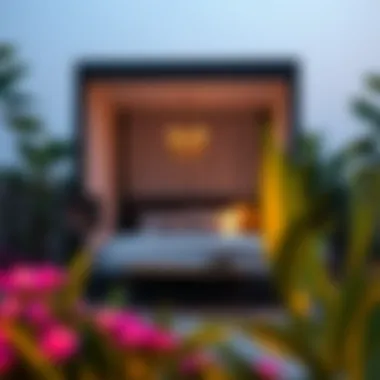

Even the best-planned garden can fall into disarray if not cared for properly. Regular maintenance ensures that your plants not only survive but thrive. Here are some essential care practices to keep in mind:
- Watering Schedule: Establish a consistent watering routine, preferably early in the morning or late evening to reduce evaporation. Drip irrigation systems can be a great investment, ensuring water reaches the roots effectively without wastage.
- Soil Health: Regularly testing soil can help you understand its nutrient levels. Consider adding organic matter like compost to boost its fertility. Proper soil ensures plants can absorb necessary nutrients and hydration, which is vital in a nutrient-scarce environment.
- Pruning and Deadheading: This involves trimming away dead foliage and spent flowers, which not only improves aesthetics but also encourages healthy new growth. Regularly inspect your plants for pests and diseases, taking action promptly to avoid widespread issues.
- Mulching: A layer of mulch can help retain moisture, regulate soil temperature, and suppress weeds. This simple technique can reduce the time spent on watering and weeding, which is crucial for busy homeowners.
"An attractive garden isn’t just about what’s there; it’s about how it’s cared for. A well-maintained garden reflects the homeowner’s investment in their outdoor space."
Maximizing Community Garden Spaces
Community garden spaces in Dubai represent a melting pot of culture, creativity, and connectivity. Understanding how to maximize these spaces isn’t just about aesthetics or functionality; it’s about fostering a sense of community and encouraging social interactions. As urban areas become more crowded, the significance of efficiently using available land for communal gardening becomes paramount.
Collaborative Gardening Initiatives
Collaborative gardening initiatives have the potential to transform barren plots of land into flourishing hubs of activity. These programs often champion the sharing of resources—tools, seeds, and knowledge. When residents come together to cultivate a community garden, they not only produce food but also build trust and camaraderie. This collaboration can break down barriers, fostering a sense of belonging which is crucial in a multicultural landscape like Dubai’s.
- Resource Efficiency: Pooling resources means reducing costs for individuals while increasing the variety and yield of what can be grown.
- Skill Sharing: An elder who has gardened for decades can pass on tricks that young enthusiasts might find invaluable.
- Social Bonds: Gardening Workshops can be set up, turning the mundane task of planting into a fun and educational experience, thus bridging generational gaps.
In essence, these initiatives bring people together, creating a vibrant community that thrives on shared experiences. Local authorities and volunteers can play a key role in establishing these programs, helping to create guidelines that ensure everyone can participate in cultivating greenery together.
Benefits for Residents
The advantages of enhancing community garden spaces ripple out to affect every resident in the vicinity. Maximizing these gardens can lead to numerous benefits that touch on health, economy, and even sustainability.
- Fresh Produce: Access to fresh fruits and vegetables can combat food deserts, which is a growing concern in many urban environments.
- Physical and Mental Health: Gardening is not just a pastime; it’s a workout. Getting your hands dirty and indulging in some sunshine can drastically improve one’s mental well-being and physical fitness. Studies show that gardening reduces stress and anxiety levels.
- Environmental Impact: Successfully maintained community gardens can contribute to improved air quality and biodiversity. They provide habitats for various flora and fauna, supporting the local ecosystem.
- Property Value Increase: Well-kept community gardens can lead to increased property values in surrounding areas, making them a direct investment source for residents.
- Educational Opportunities: By encouraging local schools to participate in gardening projects, children can learn sustainability practices from a young age.
"A community garden isn't just soil and sprouts; it’s the roots of a deep connection between neighbors."
Engaging in community gardening initiates a dialogue that is essential in urban settings. It transcends traditional boundaries, helping to weave together a narrative of cooperation, sustainability, and growth. Through embracing and maximizing community garden spaces, residents not only enrich their environment but also their lives.
Investing in Garden Space: A Strategic Approach
Investing in garden space is not merely about beautifying the surroundings; it’s a strategic move that can significantly enhance the value and appeal of a property in Dubai. The lush greenery of well-planned gardens can be a major selling point for residential properties. It’s a vibrant add-on that speaks to a lifestyle that many homeowners aspire to achieve.
Evaluating Market Trends
When it comes to garden space investment, understanding current market trends is essential. The real estate landscape in Dubai is always shifting, influenced by various socio-economic factors. Recent years have seen a surge in demand for properties that offer green spaces. This trend is driven by a growing awareness of environmental sustainability and the mental health benefits associated with nature.
To tap into this demand, investors should keep an eye on emerging community preferences. Reports indicate that buyers are leaning towards properties that provide outdoor recreational areas, such as gardens or parks. Many potential homebuyers are less interested in high-rise living that lacks greenery. Here are a few trends to watch for:
- Sustainability Initiatives: Properties with native plants and sustainable landscaping practices are in higher demand.
- Community Gardening Projects: More developments are including shared garden spaces as a feature.
- Smart Garden Solutions: Innovations in garden tech, such as irrigation systems connected to apps, attract buyers looking for modern conveniences.
Financial Implications of Garden Enhancements
Making improvements to garden spaces can represent a wise financial decision, opening doors to potential ROI that is often overlooked. While the initial outlay for landscaping or garden enhancements might seem daunting, the long-term gains can far outweigh the initial costs. Here’s how:
- Increased Property Value: Lush and well-designed gardens can boost the market value of a home. Properties with appealing outdoor spaces often command higher prices, sometimes even outperforming similar homes without gardens.
- Lower Maintenance Costs: Investing in quality components, like native plants, can lead to reduced water and maintenance costs over time, meaning greener pastures for your wallet.
- Potential for Revenue Generation: In areas with high tourist traffic, well-constructed gardens can be a part of a rental strategy or serve as an event space, offering another revenue stream that many investors might not consider.
**"Gardens are a foot in the door of nature and a pathway to higher home values."
Future of Garden Spaces in Dubai
As the urban sprawl of Dubai continues to surge, the future of garden spaces holds a unique promise for enhancing both residential living and the ecological balance of the city. The significance of this topic cannot be overstated. With rapid development and an increasing demand for housing, optimizing garden spaces becomes a strategic endeavor for investors and homeowners alike. This exploration into garden spaces not only aligns with aesthetic desires but also taps into sustainability—a pressing consideration amid growing environmental concerns.
Emerging Architectural Innovations
Architectural designs are evolving to incorporate greenery more dynamically. Concepts like green roofs and walls are becoming commonplace, especially in the context of Dubai's fluctuating climate. These innovations provide more than just visual appeal. For instance, a building adorned with a vertical garden can effectively lower indoor temperatures, subsequently decreasing cooling costs. Moreover, these types of designs offer air purification benefits—an essential factor in a bustling city where pollution can be a concern.
Smart technology is also paving the way for modern gardens. Irrigation systems equipped with sensors can adjust water usage based on soil moisture levels, which drastically cuts water waste—an invaluable resource in the arid conditions of the Gulf region. Additionally, automated gardening solutions can ensure that plants receive optimal care with minimal effort from homeowners, thereby encouraging more people to cultivate and maintain their outdoor spaces.
"Incorporating nature into architectural designs is not just aesthetic; it's essential for fostering a healthier urban ecosystem."
Shifts in Urban Living Trends
As society trends toward a more sustainable lifestyle, the notion of urban gardening is gaining traction among residents. The shift is palpable; people are increasingly looking for ways to reconnect with nature amidst the concrete landscape. Balconies and rooftop spaces are turning into small oases where herbs and vegetables flourish, reflecting a growing consciousness about food sources.
Furthermore, community gardens are springing up as a response to this urban yearning for green spaces. They serve multiple purposes—not only do they provide fresh produce, but they foster community ties and a sense of belonging. With initiatives promoting these communal spaces, residents are encouraged to engage with one another, sharing tips and produce alike.
In terms of market implications, this shift in urban living trends can enhance property value. Homes with gardens or nearby green spaces are becoming sought after, leading to potentially fruitful investments for property owners. It’s essential to note that gardens are no longer merely decorative; they’re now seen as necessities—creating an emotional connection that can influence buyer decisions.
